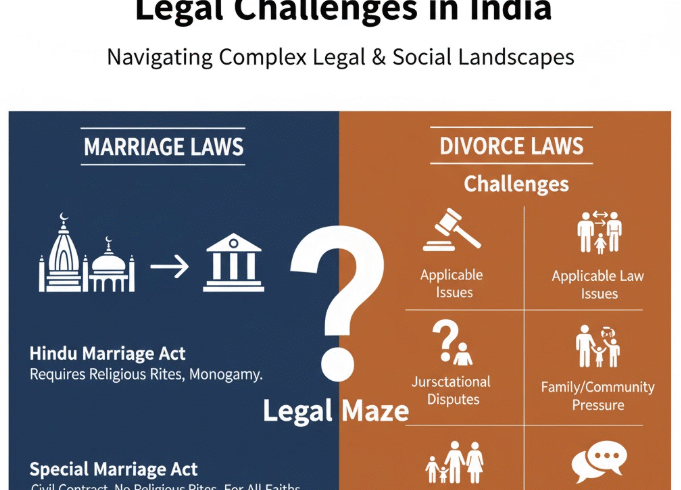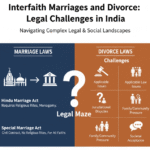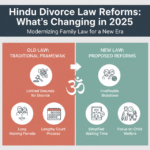Talaq, Talaq, Talaq, and the Fallacy of Instant Justice
Shayara Bano had received a letter in 2016 with the word “talaq” written three times, and her 15-year marriage was over. Her husband was not required to appear in a court, nor was he required to secure her consent (or even speak with her). This harmful practice, called Triple Talaq, had ruined innumerable lives before Indian lawmakers decided that enough was enough.
The tale of Muslim divorce laws in India is one of transitions, bravery and progress. And by juxtaposing ancient customs with modern reforms, its trajectory illustrates how a community can change while holding fast to its faith. Muslim women have more security in India today than ever before, but the way forward remains fraught.
What Triple Talaq Actually Means
The practice, known as Triple Talaq, or “Talaq-e-Biddat” in legal parlance, once allowed some Muslim men to divorce their wives by saying or writing the word “talaq,” meaning divorce in Arabic, three times. This could be a matter of minutes — on the phone, by text message or even over WhatsApp. When those three words were uttered, that was the end of the marriage.
This practice was based on interpretations of sharia, Islamic law, but here’s something crucial: most Muslim-majority countries had already prohibited it. Pakistan outlawed it in 1956. Bangladesh followed suit in 1972. Even Egypt, Indonesia and Saudi Arabia had curbs on instantaneous divorce. India was one of the last nations where it remained legal.
For more insights on legal reforms in India, visit https://zistalegalis.com.
The Human Cost
Thousands of Muslim women in India were divorced by their husbands via instant triple talaq between 2010 and 2017. They lost their homes, their financial stability and in some cases their children — all with no notice or opportunity to defend themselves. Dozens were left with nothing but the clothes on their backs.
The custom affected women of all social classes:
- Brides in their young twenties
- Mothers with several children
- Elderly women, particularly those in long-term marriages
- Women who had sacrificed education or careers for their families
The 2017 Landmark Judgement by The Supreme Court
The Supreme Court of India changed history on August 22, 2017. In a historic ruling, a bench of five judges belonging to diverse religious communities convened. Three out of them pronounced Triple Talaq as unconstitutional. The practice that had destroyed so many lives was finally declared illegal.
The judges didn’t just arrive at a legal decision — they rendered a statement about equality and dignity. They cited that a religious practice can still violate basic human rights. Writing for the five-judge panel, Justice Kurian Joseph argued that the practice violated basic Islamic tenets and went against Islam’s emphasis on justice and equity.
The Muslim Women Act of 2019
The Supreme Court ruling was only the beginning. On July 31, 2019, Parliament passed the Muslim Women (Protection of Rights on Marriage) Act. This law not only prohibited Triple Talaq—it criminalized it.
Key Provisions of the Law:
Criminal Offense: Provides for imprisonment up to 3 years and fine for any Muslim man who gives Triple Talaq to his wife.
Financial Aid: Up to 18,000 rupees or as decided by magistrate.
Order of Custody: The woman is also entitled to custody of her minor children.
Bail: The bail may be granted only after hearing the wife.
Immediate Effect: Any such triple talaq would be void and illegal.
Real Changes on the Ground
And the law has led to real changes in people’s lives. In 2020 a man in Bareilly, Uttar Pradesh, was one of the first to be arrested under the new law for divorcing his wife via Facebook. The rapid response sent a clear message: instant divorce would be tolerated no more.
Women can take their complaints to police stations now! Women’s rights groups, meanwhile, say the threat of legal action has deterred many men from trying instant divorce. The law has teeth, and people understand that.
Numbers Tell the Story
As per the data from Ministry of Law and Justice:
- Cases were reported during the first two years of implementation of the law
- 82% of cases led to reconciliation or due process in divorce
- More than 15 million Muslim women have been made aware of the law through government campaigns
- Legal aid applications made by Muslim women skyrocketed by 45% since 2019
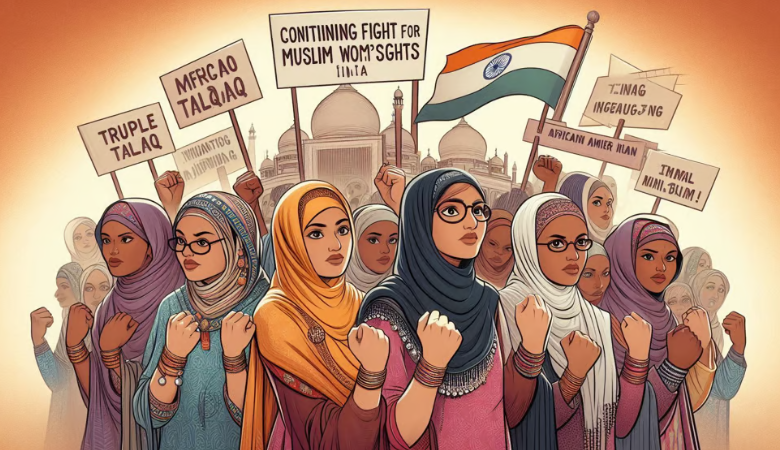
Other Modes of Dissolution of Muslim Marriages in India
Triple Talaq was only one thing in Muslim personal law. There are a number of other approaches, and understanding them helps us to understand the whole picture.
Talaq-e-Ahsan: The Proper Way
This is the preferable kind of divorce according to Muslim teaching. Here’s how it works:
- The husband pronounces talaq once
- The couple undergoes a period of three menstrual cycles, known as the ‘Iddat’
- If they can get along during this time, then they can reconcile
- If the parties do not reconcile, an absolute divorce is granted
- The wife gets her Mehr (marriage gift), maintenance during Iddat
Talaq-e-Hasan: The Good Method
Like Talaq-e-Ahsan with minor differences:
- Talaq is pronounced three times
- Each announcement occurs in a different Tuhr (period of purity between menstrual cycles)
- Reconciliation is available before the 3rd pronouncement
- Once all three pronouncements are issued, divorce is obtained
Khula: When Women Seek Divorce
That Muslim women have always had the right to seek divorce is a little-known fact for many. Khula enables a woman to initiate a divorce — often by returning her Mehr or paying compensation to her husband. This process requires:
- Filing a petition in court
- Trying to reconcile via arbitration council
- A court that concludes the divorce if a reconciliation is not possible
You can learn more about women’s rights in divorce proceedings through resources like the National Commission for Women.
Mubarat: Mutual Agreement
When both sides want separation, they have the option of Mubarat. That’s divorce by mutual consent, similar to that provided for under Hindu and secular marriage laws in India.
How Muslim Divorce Laws Compare With Other Laws in India
There are different personal laws in India for people of different religions, and this may sound confusing. Here’s a simple comparison:
| Aspect | Muslim Law (After 2019 Reforms) | Hindu Marriage Act | Special Marriage Act |
|---|---|---|---|
| Instant Divorce | Illegal and punishable | Not allowed | Not Allowed |
| Mutual Consent | Allowed (Mubarat) | Allowed | Allowed |
| Grounds for Divorce | Multiple grounds available | 13 specific grounds | Similar to Hindu Act |
| Maintenance | During Iddat + under Sec 125 CrPC | Permanent alimony possible | Possible |
| Child Custody | Mother’s custody for young children | Best interest of child | Best interest of child |
| Waiting Time | Iddat period (3 months approx.) | No waiting in mutual consent | 6 months for mutual consent |
What Still Needs to Change
Although the ban on Triple Talaq was an important step forward, there are still many challenges that Muslim women in India need to overcome.
The Maintenance Problem
According to Muslim personal law, a divorced woman can claim maintenance only for the Iddat period (which lasts approximately three months). After that, her family is supposed to provide for her. This is in contrast to Hindu law, where permanent alimony may be awarded.
But Muslim women can continue to apply for maintenance under Section 125 of the Criminal Procedure Code, which is available to all Indians irrespective of religion. The landmark Shah Bano case in 1985 affirmed this right, although it has continued to be a contentious issue.
Polygamy Still Legal
Men are permitted up to four wives under Muslim personal law, though there is a condition about treating all with equality. This is prohibited under many other marriage laws in India. This practice has provoked a fierce debate among women’s rights activists and campaigners who say it should change to reflect equal rights.
Nikah Halala: The Controversial Practice
In the ‘Talaq-e-Hasan’ form, if a man gives his wife talaq three times on different occasions and intervals, he would not be able to remarry his former wife again unless the woman has married someone else and consummated that marriage followed by a divorce. This is called Nikah Halala and has been criticized as demeaning to women. It has been the subject of a number of petitions in courts, challenging its legality.
Proving Divorce in Court
Even though Triple Talaq was banned, women continue to struggle to prove that they were indeed divorced: the divorce may have been pronounced verbally or communicated through messages. Better documentation systems are needed.
Success Stories: Women Taking Charge
Despite the hurdles, many Muslim women are using the new laws to improve their lives.
Ishrat Jahan in Kolkata endured years of abuse before she found the courage to file a complaint under the 2019 law. Her husband not only landed up in jail, but she was awarded the custody of both her children and monthly maintenance.
Afreen Khan of Mumbai invoked the law to secure a just settlement in her divorce. When her husband threatened to divorce her, she told him about the criminal penalties. She was allowed proper legal proceedings, and awarded her Mehr, six months’ maintenance as well as the family home.
These stories embolden other women to fight back.
What Other Countries Have Done
As we consider the path forward, let’s look at what other Muslim-majority countries can teach us about divorce.
Tunisia boasts one of the most progressive family laws, mandating that anyone seeking a divorce must do so through courts and giving both partners equal rights in divorce.
Morocco reformed its family code in 2004, including making divorce a matter for the courts and granting better rights to women over maintenance and child custody.
Pakistan, for instance, outlawed Triple Talaq long ago but has failed to enforce its ban, proving that laws are no match without implementation.
Turkey has a completely secular family law system in the entire country which gives all people equal rights no matter what their religion is.
Muslim Organizations and Clerics
Several Muslim scholars and religious bodies have backed divorce reforms. The All India Muslim Personal Law Board (AIMPLB) has spoken against legal intervention; however, it also campaigned for better divorce practices among the community.
Progressive Muslim scholars say that instant divorce was never inherently Islamic. They reference Quranic verses that stress reconciliation, justice and gradual processes for terminating marriages.
Groups such as the Bharatiya Muslim Mahila Andolan have led from the front in pressing for reforms that remain consistent with Islamic philosophy. They have conducted surveys, organized community meetings and educated women about their rights.
For comprehensive legal guidance, explore resources at https://zistalegalis.com.
Education and Awareness: The True Game Changers
Laws only work if people know about them. Some of the initiatives have recently been taken by Government and NGOs:
- Helpline numbers for Muslim women facing triple talaq
- Legal aid camps in Muslim-dominated areas
- Sensitization programs in madrasas and community centers
- Multilingual leaflets distributed through ASHA workers
- Social media campaigns targeting younger generations
Many Muslim women’s groups host workshops that teach women about their rights under the law, how to document a marriage accurately and where to go for help.
The Question of Uniform Civil Code
The Muslim divorce law reforms have also revived the debate over having a Uniform Civil Code (UCC) in India, which means same laws for all citizens irrespective of what religion they observe.
Arguments in Favor:
- Would guarantee the same rights for ALL women
- Would simplify the legal system
- Would promote national integration
- Would end all discriminatory practices under personal laws
Arguments Against:
- Could imperil religious freedom and minority rights
- Could enforce values of the majority community onto others
- Challenges in implementing in a diverse country
- Could lead to social unrest
The fact is that reform can take place within personal laws, as demonstrated by the ban on Triple Talaq. The debate whether India needs a UCC or reform of the existing personal laws is ongoing.
What Young Muslims Think
Younger Muslims in India differ on marriage and divorce from their parents. Polling of Muslim college students finds:
- 78% are in favour of the ban on Triple Talaq
- 65% of respondents favour increased women’s rights in cases of divorce
- 54% are willing to register marriages by secular law
- 82% think that there should be mutual consent by both partners in divorce
This generational shift hints that some future reforms may meet less internal resistance.
Moving Forward: What Comes Next
The ban on Triple Talaq was a pivotal first step, but the effort toward achieving equality in Muslim family law is ongoing. Here’s what experts say should come next:
- Better Enforcement: Enforce the law as it exists today across the country
- Compulsory Registration: Mandatory Nikah registration to protect the rights of women
- Extended Maintenance: Allowing divorced women to receive maintenance for a longer period
- Better Documentation: Develop uniform divorce paperwork
- Child Custody Reforms: Overhaul custody laws to be in the best interest of the children
- Reform Nikah Halala: Look into, and perhaps regulate, this contentious practice
- Community Support: Create and support more networks for divorced women
Why These Reforms Are a Matter of Public Interest
These changes are not only about Muslim women — they are also about fundamental rights and human dignity of all Indians. By serving some of the most vulnerable people in society, and when we protect those who are most at risk or suffering in our community, they help to build up our greater social fabric.
The Triple Talaq ban demonstrated that India has an appetite for respecting its religious traditions as well as for addressing violations of its constitutional guarantees. It demonstrated that, when there is political will, judicial courage and public backing, reform can happen.
Every woman, regardless of her belief, deserves:
- The right to be heard before marriage falls apart
- Financial security after divorce
- Opportunity to raise her children
- Legal protection from arbitrary decisions
- Respect and dignity throughout the entire process
Wrapping Up
The abolition of Triple Talaq shall be a pinnacle of Indian legal history. It is a triumph of gender justice over patriarchal systems which had no place in contemporary times. Shayara Bano and the scores of other courageous women who challenged this practice were not fighting only for themselves, but for generations yet unborn.
But rules on paper matter only so much without enforcement, education and social change. Where the rubber meets the road is how society accepts these reforms and whether we can go on to demand full equality in all personal laws.
Muslim women in India today enjoy more legal protection than ever before. They can marry with certainty that their marriages cannot be dissolved at the whim of a man. They can go to courts, police stations and legal aid centers without any fear. They can construct their lives with the knowledge that the law is on their side.
But there’s still work to do. The debate on reform should not stop with Triple Talaq. It must go on until every Indian woman, whatever may be her religion, has equal rights in marriage and other matters.
And the narrative of Indian Muslim divorce reform is far from over. Every woman who demands her rights, every judge who rules fairly, every social worker who raises awareness and every family that treats women equally — they are all the scriptwriters of this never-ending story.
Change is slow, but it does happen. Triple Talaq is a good example to illustrate that when the cause of justice demands, we can reform age-old practices. The next question is: what now?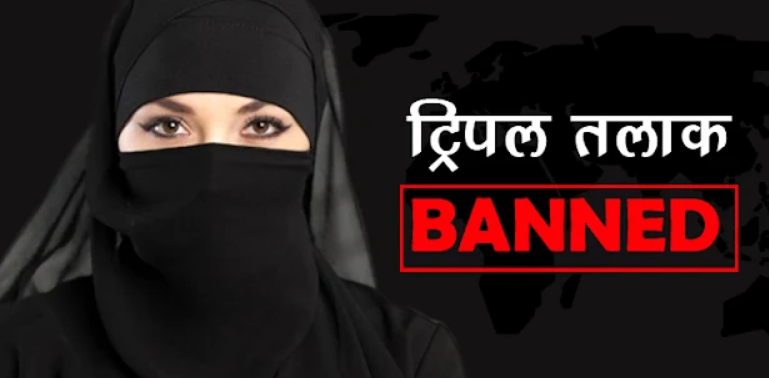
Frequently Asked Questions
Q1: Has all forms of Triple Talaq been banned in India now?
Yes, Triple Talaq (Talaq-e-Biddat) is absolutely banned in India from August 2019. A man who practices instant divorce can be punished with a jail term of up to three years. The divorce, too, is legally null, or of no legal effect.
Q2: Can a woman in India demand divorce according to Muslim law?
Absolutely. Muslim women can divorce by either Khula (returning the Mehr or compensating the husband) or judicial relief under Dissolution of Muslim Marriages Act, 1939. Such grounds can include cruelty, desertion, impotence or a husband’s failure to provide maintenance.
Q3: What is maintenance after divorce for Muslim women under law?
Women are entitled to maintenance under Muslim personal law for the period of Iddat (about three months). But they can also ask for maintenance under Section 125 of the Criminal Procedure Code (CrPC) — which supports women who have no means of livelihood and cannot maintain themselves. Courts have granted maintenance to Muslim women who have been divorced, even for life in some cases.
Q4: Do Muslim women have the right to keep children after divorce?
Yes. In Muslim law, mothers typically have custody of young children (boys until they are 7 years old and girls until puberty), after which custody arrangements are made in the best interests of the child. Courts are giving prime importance to the interests of children as opposed to set rules, and also extending maternal custody.
Q5: Is Nikah registration necessary in India?
Registration requirements vary by state. Some states have made Nikah registration mandatory, others optional but encourage it strongly. Marriage registration certificates serve as legal evidence of marriage and provide protection in case of disputes.
Q6: Can a Muslim man in India still have more than one wife?
Muslims are allowed to have multiple wives (four at most) provided there is equal treatment between the wives. This, however, is controversial and has been restricted in some states. Women can stipulate monogamy in their marriage contract (Nikahnama).
Q7: What is the punishment for giving Triple Talaq now?
The Muslim Women (Protection of Rights on Marriage) Act, 2019 has made the offence of giving Triple Talaq cognizable and non-bailable. The penalty is imprisonment for up to three years and/or a fine. The magistrate can grant bail only after hearing the wife.
Q8: Is it possible for Muslims in India to resort to divorce under secular law rather than personal law?
Yes. Muslims married under the Special Marriage Act, 1954 (a secular law) can get divorced as per that act. But as for those wedded under Muslim personal law, most of them adopt the Muslim mode of divorce or opt for judicial divorce under the Dissolution of Muslim Marriages Act, 1939.
Q9: What is the difference between Mehr and maintenance?
Mehr is a mandatory gift from the husband to the wife upon marriage, specified in the Nikahnama. The balance becomes due at the time of divorce or death of the husband. Maintenance, as opposed to Mehr, is the husband’s support for living expenses which he should pay during the marriage and after divorce during Iddat.
Q10: Where can Muslim women seek legal help in cases of divorce?
Muslim women can approach the District Legal Services Authorities for free legal aid; reach out to Muslim women’s rights organizations like the Bharatiya Muslim Mahila Andolan; contact the National Commission for Women helpline (7827-170-170); or seek help from lawyers who handle family law cases. Most states also have women’s police cells and family courts.
For more legal insights and resources, visit https://zistalegalis.com.


